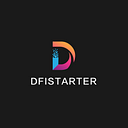Dfistarter Dual Token System: $DFI and $DFA
In our previous post, we went into detail about some of the current and upcoming features of the Dfistarter platform. As the first Dfinity-based launchpad, we aim to innovate and to offer numerous features that other launchpads within the industry do not.
In order to bring our vision to reality, we quickly understood the importance of decentralization and utility and how fragile these two concepts are. Most launchpads have their native tokens, yet we chose to go a step further and to create our own dual token system which powers both the governance system for the platform and the access to allocations.
In this blog post, we are going to explore our two tokens, $DFI and $DFA. We will take a look at their technical specifications, see how they work and what they are used for. In a future post, we’ll also dig deeper about the tokenomics of our project, so stay tuned for future updates.
A novel and transparent system
As we mentioned above, we aim to create a new and fairer model by deploying two tokens within the Dfinity chain, $DFI and $DFA. We did this to separate the governance aspect from the economic incentives associated with being a token holder.
As so, $DFI acts as a decentralized governance token and $DFA acts as the utility token which grants access to allocation pools. However, while these two are separate, they are still intertwined to ensure that those who invest in the project also have the best interests of te Dfistarter platform in mind.
So, let’s dig deeper into each of these tokens, starting with $DFI.
$DFI: The Governance token $DFA
$DFI is the heart of the Dfistart project. Its the voice of the community and it allows it to be heard. The token holders can vote on proposals for both the community and project infrastructure.
With a fixed supply of 100,000,000 $DFI tokens, holders can stake their bags in order to get access to the $DFA utility token or they can also burn $DFI tokens in order to get “boosters”. Don’t worry, we’ll explain all of this in detail.
$DFA: Access to Allocation Pools
So, now that you’ve earned your $DFA by staking the governance token, you can participate in the Initial Decentralized Offerings (IDOs) hosted on Dfistarter. Do note that all allocations will be shared proportionally among users who subscribe to the IDO projects.
With this model we ensure that those that are interested in the governance of the platform are the same people that are investing in the projects there hosted. However, there is also a unique feature that sets us even further apart from other launchpads and that is our Booster Program.
The Booster Program
The Booster program was developed by our team as a unique offering of the DfiStarter IDO Launchpad. Designed as a tradable Non-Fungible Token (NFT), the Boosters are used to multiply the subscribed allocation amounts.
If you happen to buy a 2x booster and apply it to your favorite project then you will be able to receive twice as many tokens as you would without said booster.
For each project hosted on our platform, there will be multiple types of Boosters and these can be bought by burning the $DFI token. This system ensures that the supporters of the project are somewhat rewarded on a speculative basis as the supply of the governance token decreases while demand grows with the influx of new and exciting projects to invest in!
About DfiStarter
DfiStarter is a Dfinity-based launchpad for token pools and auctions. As the first project accelerator for the Dfinity ecosystem, DfiStarter provides premier projects built on this next-gen blockchain platform with crowdfunding, marketing, AMM, public relations, and tech support services.
By providing premier Dfinity projects with all the tools they need to have a successful launch and prosperous lifecycle, DfIStarter creates the perfect environment for lucrative and secure crowdfunding opportunities within the blockchain ecosystem.
DfiStarter also provides its users and projects additional tools like an AMM-based Decentralized Exchange, Money Market Services, Oracle Integrations and more.
To learn more about DfIStarter, join the community here:
